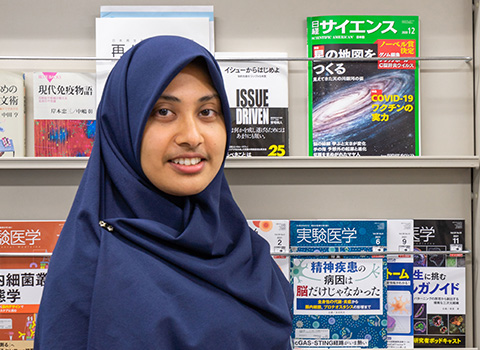Graduate School ofSystems Life
Sciences
- DEGREE
-
- Master of Systems Life Sciences / Engineering / Philosophy / Science
- Doctor of Systems Life Sciences / Engineering / Philosophy / Science
- CAREERS
-
- Researcher
- DEPARTMENT
-
- Systems Life Sciences
- COURSES
-
- Bioinformatics
- Life Engineering
- Medical Life Sciences
- Biological Sciences
- APPLICATION PERIOD
-
-
Research StudentsApril Admission: Mid December, every year
October Admission: Mid June, every year - Master’s ProgramOctober Admission: April, every year
-
Doctoral ProgramOctober Admission: April, every year
October Admission (For CSC applicants): December, every year
-
Research StudentsApril Admission: Mid December, every year
OVERVIEW
Our Graduate School of Systems Life Sciences is essentially a multidisciplinary unit, with experts in engineering, biology, information science, and medical research. We use a systems approach, considering the complexities and interactions in life sciences. That’s why we have the “Systems” in the name of our School. To really understand how things work and to really be creative, we need to use a systems approach to analyze from multiple perspectives how everything interacts and how everything is connected.
Modern society faces a variety of problems. Environmental problems are becoming more serious, and medical problems are becoming more complex. These issues cannot be solved by one specialty alone. Therefore, we offer a multidisciplinary approach, combining engineering, biology, information science and medical research. We have the divisions of 1) Bioinformatics, 2) Life Engineering, 3) Medical Life Sciences, and 4) Biological Sciences. The mission of our school is to nurture young researchers who have multi-perspective to life sciences to understand and solve the current situation and contribute to a bright future. Our school has a variety of attractive programs to help you face the challenges of today's society and create a brighter future.
Student’s Voice
- What is your research about?
- I joined Katayama Laboratory which belongs to the Chemistry and Biochemistry Course to pursue my interest in designing drug delivery carrier. Currently, I am carrying out a topic of nano-sized drug carrier design based on synthetic polymer interaction. The main purpose is to achieve knowledge for efficient cell penetration and how to modulate cell-carrier interaction. With intimate supervision and warm support from professors and other group members, together we manage to overcome several challenges in the ongoing-work and present it in some domestic and international conferences. Chances for discussion and joint research are also openly available with some experts from other labs or even other universities.
- What is an advantage of Kyushu University?
- Ito Campus has state-of-the-art facilities to support research of wide range of fields, which are mainly located in West zone and a part in East zone (I²CNER building) of Ito campus. In my research, to observe physicochemical properties of carriers and their interaction with cells, I mainly utilize various microscope for micro- to nanoscale observation, including fluorescence microscope, confocal laser scanning microscope, atomic force microscope, and transmission electron microscope.

(From Indonesia)
